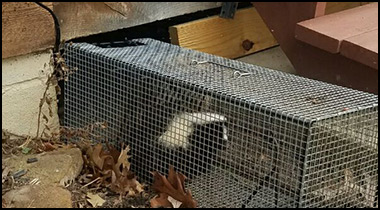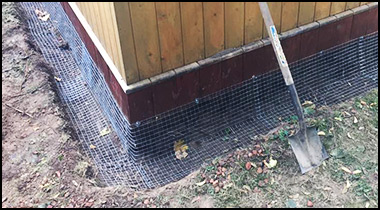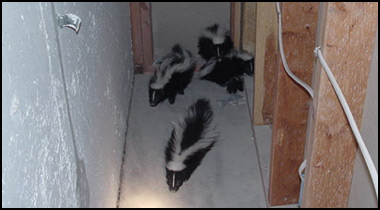St. Paul Skunk Removal Resources
Skunk Rehabber - Wildlife Rehabilitation Center: (651) 486-9453
Free Ramsey County Animal Services: (651) 645-7387
Humane Wildlife Trappers of St. Paul: 763-703-2600
If you need skunk control in St. Paul, you have a few options. First, you can attempt to solve the skunk problem yourself by reading our do-it-yourself guide. If you need outside help, you can also call Ramsey County Animal Services to see if they have any free resources or help for you - however, they primarily deal with dog and cat concerns. You can also call a local St. Paul wildlife rehabber, as they are typically a great resource for advice that is in the best welfare of the animal. If as a last resort you must hire a professional company, we recommend Humane Wildlife Trappers of St. Paul at 763-703-2600. To learn more about them or check their skunk removal prices, visit saintpaulpestanimal.com.

St. Paul Skunk Trapping and Removal

Preventative Repairs & Exclusion

St. Paul Skunk Removal From Structures
In many cases, preventative measures can solve your St. Paul skunk problem - keep garbage secured, pet food indoors, and most of all when it comes to skunks, secure the perimeter of your shed, porch, deck, or house with a barrier - lattice or steel mesh is good, and it keeps Minnesota skunks from going under the structure. If trapping and removal of the skunk is the only option you have, please do so with the help of a local agency or professional company who knows how to do it humanely and legally. Browse the resources of this site for more educational information.
Frequently Asked Questions:
Prevention: How to Keep Skunks Away
What to do with a skunk after I catch it?
Is it legal for me to trap a skunk?
How to remove skunk odor
Is a skunk active during the daytime rabid?
What does skunk feces look like?
St. Paul Skunk Control Information: How to remove a skunk in the basement, attic, or anywhere in a house
While desacked and domesticated skunk can turn to be wonderful pets, the wild skunk will bring many problems around you. They can dig the shallow holes into the yard in order to find the insects and they will forage in the garden and garbage. It will burrow under the home and will lead to too much damage on the wire while their spray can be hard to remove when it sprays near your home. You have to know how to remove them while at the same time, being caution on how you can avoid to be sprayed.
Skunks look for the shelter in the first months of winter and a place where they can mate in the end. If a male chooses to approach a female, it may decide to reject him and this may lead to offensive spray and this will make the foundation and the basement to smell. Skunk will be having litter in April or May and such babies require careful handling or they will spray on anything they find around when they are frightened or startled.
When the skunks are found under your house, you should deal with this problem through finding their entry points and then use the traps for capturing adults. When the babies are able to leave their den, you can use the exclusion tactics like a one way door in order to remove them away of your home. If the kits are young to be able to leave alone, then you have to get a professional in getting rid of them.
When you are sure that the skunks have been removed safely, you should seal up the entry points which it uses to enter into the house. You should use chemical spray so that you can remove skunk musk or it will permeate the house and last for many months.
Porches and decks will tend to have high clearance and they have many potential entrances. This means that removing skunk from this place is more difficult. The best way to keep the skunk away is to use exclusion. You may need sealing up the borders and leave just one entry point. The barriers have to extend one foot under the ground so that you can discourage any burrowing. You can trap the skunk to take it in other location if it is legal in your area. The trap should be large enough to hold a house cat but at the same time short to prevent the skunk from spraying
Remember, for free services you can try (651) 486-9453 or (651) 645-7387, but if you need to pay for professional help, check the prices at the saintpaulpestanimal.com website. Or follow our do-it-yourself guide!

